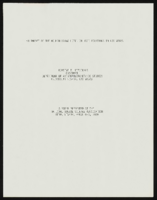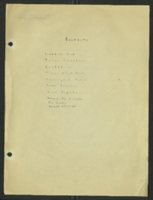Search the Special Collections and Archives Portal
Search Results

Donna Robinson oral history interview: transcript
Date
Archival Collection
Description
Oral history interview with Donna Robinson conducted by Barbara Tabach on December 20, 2019 for the Remembering 1 October Oral History Project. Robinson begins by talking about her family and childhood in Pittsburgh, Pennsylvania. She talks about her family life and how she started working at the American Red Cross as a Disaster Program Specialist. Robinson describes her first disaster situation she worked through, later disaster situations, and the different training that is required in order to handle certain situations. Robinson then begins to talk about October 1, 2017, and how she tried to help as many people as possible that night. Then she talks about the long-term effects of the shooting and how it impacted the survivors and the community. She discusses the mental health aspect of the services Red Cross had and how it still continues to serve the community today.
Text

Daniel A. Moore interview, March 3, 1979: transcript
Date
Archival Collection
Description
On March 3, 1979, Norwood Germany Jr. interviewed Daniel A. Moore (b. 1939 in Fort Worth, Texas) about his life in Las Vegas, Nevada. Moore begins by speaking about his move to Las Vegas from Utah at a young age, his education and his work in construction and at the Las Vegas McCarran Airport. Moreover, Moore speaks about his involvement with church and his recreational hobbies such as bowling. Moore also spends time speaking about the African American population in Las Vegas, the jobs available to them, racial tensions in his young adulthood versus his children’s experiences, and the segregation of black communities into the Las Vegas Westside. Lastly, he talks about the city’s growth, tourism and the economy, the development of different shopping centers and malls, and the city’s law enforcement.
Text

Preprint, Where I Stand: The Record of a Reckless Man, by Hank Greenspun with Alex Pelle, 1966
Date
Archival Collection
Description
Book proof with annotations from editors in the margins.
Text

"An Impact of the Moulin Rouge Hotel on Race Relations in Las Vegas": paper by Roosevelt Fitzgerald
Date
Archival Collection
Description
From the Roosevelt Fitzgerald Professional Papers (MS-01082) -- Unpublished manuscripts file. Presented to the National Social Science Association, Reno, Nevada.
Text

Mabel Hoggard: folder of materials related to her artistic interests
Date
Archival Collection
Description
Folder of materials from the Mabel Hoggard Papers (MS-00565) -- Personal papers file. This folder contains poems, quotations, essays, and short stories. It also contains Living Blues magazine (autumn 1971), a concert poster for vibraphonist Jay Hoggard, magazine clippings, visual art, letters, programs, and The Nixon Theater booklet (season 1903 and 1904, not digitized in its entirety).
Mixed Content

Transcript of interview with Judy Jetter by Lisa Gioia-Acres, September 10, 2008
Date
Archival Collection
Description
Judy Jetter, a devout jazz music enthusiast, was born in a Chicago suburb in 1939. At the age of three, Judy began taking acting as well as tap and ballet classes. While raised by her mother until age 15 Judy was forced to study opera even though jazz music was her passion. Her first introduction to jazz came while listening to, legendary jazz great, Woody Herman on the radio. Judy developed an instant appreciation and love for jazz music. While working as a commercial actress during her childhood - Super Circus and Peter Pan peanut butter - Judy experienced live performances by the Stan Kenton Orchestra and was completely amazed. After graduation Judy was married and gave birth to her son. She worked for a movie studio in Chicago doing various jobs such as cleaning the stage, typing scripts, model work, and even playing the role of housewife. Later Judy went to college and earned a degree in psychology, which led to a job as a therapist. However, after remarrying to Bill Jetter, Judy switched careers and soon became an exercise instructor at the YMCA. There she cultivated her passion for working with people who suffered from disabilities. In particular, Judy developed a water regiment specifically designed for people with disabilities. Judy would go on to share her experiences in this field in two subsequent book publications. Unfortunately Judy's husband passed away with cancer. However, Judy found refuge and support from a group of jazz enthusiasts. Alongside her cadre, Judy began really studying how to listen to music. She moved to Las Vegas in 1992 and can often be found at different jazz venues throughout the city. She enjoys the local jazz scene in Las Vegas and making her weekly rounds to take-in Big Band and jazz singers such as Jobell and Terri James, as well as going to see Bruce Harper playing at Bugsy's, and the talented Gus Mancuso performing at the Bootlegger. Judy believes that music, like everything else, has evolved and will continue to mature; however, jazz musicians such as Louis Armstrong still remain as the foremost contributors in the long history of jazz music. Her hope is that music and the arts will continue to be offered through education to allow the next generation another "dimension to not only their education but their soul."
Text

Maria Moore interview, August 2, 2019: transcript
Date
Archival Collection
Description
Interviewed by Elsa Lopez. Born in Belize, Director of AARP, speaks English, Spanish and Creole. Specialist in senior affairs.
Text

Transcript of interview with Henry Clay Davis by Wendy Christian, March 5, 1978
Date
Archival Collection
Description
On March 5, 1978, collector Wendy Christian interviewed truck driver Henry Clay Davis (born April 19, 1900 in Irondale, Virginia) in his home in Las Vegas, Nevada. This interview covers Henry Clay Davis’s personal life history as a resident of Las Vegas, which includes hunting and fishing. He also discusses employment, the railroad, old hotels, the Davis Dam, and Lake Mead. Additionally, he offers a detailed description of the Helldorado.
Text

Brian Greenspun interview, 2018: transcript
Date
Archival Collection
Description
Interviewed by Barbara Tabach. Publisher of Las Vegas Sun, child of Hank and Barbara Green. Part 1 Subjects: Las Vegas Sun, Greenspun family, Israel gun running; Part 2 subjects: Journalism importance, Las Vegas Sun, Watergate tie-in with Hank's safe, October 1 shootings reflections; Part 3 subjects: Hank and Barabara Greenspun. Talks about Jewish visionaries of Las Vegas that includes Art Marshall, Jack Entratter, Sheldon Adelson, Nate Mack; Part 4: Interviewed by Barbara Tabach. Las Vegas Sun newspaper publisher and native Las Vegan talk about events and people from Las Vegas' years of him growing up. From watching pink smoke from test site to hanging out with friends in the John S. Park neighborhood to racial riot of 1969 to playing golf as a kid.
Text

Transcript of interview with Millicent Rosen by Barbara Tabach, June 23, 2015
Date
Archival Collection
Description
Until her passing in 2017, Millicent (Siegel) Rosen was the living link to Benjamin “Bugsy” Siegel, one of Las Vegas’ most notorious links to the Jewish mob. A steadfastly independent woman herself, Millicent recalls Benjamin as a loving father to her and her younger sister. She is proud of his status as a Las Vegas visionary, though she affixes a footnote that the city of today might not be to his liking. She includes a few anecdotes about common names of the early days, including Meyer Lansky who walked her down the aisle when she married Jack Rosen. They had three children: Benjamin, Cindy, and Wendy. Millicent moved to Las Vegas to be with her daughter and her family in about 2000 and cherished her role as a grandmother. Always an artist at heart, Millicent once painted canvases for needlepoint and in 2015 promoted her clothing line.
Text
